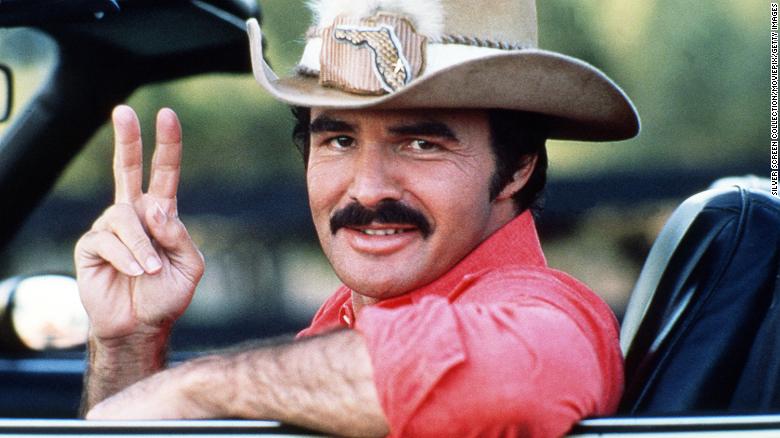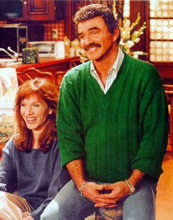BR
Burt Reynolds has died. When I was a kid he was probably the biggest star in the world. He was an actor whose name guaranteed a certain type (or two) of entertainment.
Born in 1936, he was a decent football player in college, but after a few injuries decided acting was a better risk. He got into theatre, even doing Broadway, and by the late 50s had moved into TV, appearing as a regular on the short-lived series Riverboat. He later became a regular on Gunsmoke and starred in Hawk and Dan August, though these last two weren't hits.
I never watched any of these shows, but I have seen some of his 60s TV guest roles, especially his funny turn as Rocky Rhodes, a Marlon Brando parody in a Twilight Zone episode. (Apparently he and Brando met, and Brando hated him.)
By the late 60s, Reynolds was starring in movies. He wasn't a major name yet, but his performance as a tough outdoorsman in the grim drama Deliverance (1972) put him in the big leagues.
Around this time, he started appearing on the Johnny Carson show, and his witty, easygoing style helped win him fans. He also did a centerfold for Cosmopolitan which got him a lot of attention, though probably meant that people didn't take him as seriously as an actor.
Nevertheless, for the rest of the 70s and a bit beyond, he was a--maybe the--top star in Hollywood. He would, on average, star in two films a year--one for his good old boy fans, one for his more sophisticated audience.
Examples of the good old boys films: W. W. And The Dixie Dancekings, Hooper and The Cannonball Run. The biggest by far in this category is Smokey And The Bandit, a highly entertaining film that took advantage of both Burt Reynolds' charisma and the CB radio craze. In fact, Smokey was so big the only film that made more money in 1977 was Star Wars.
Examples of his more sophisticated films (by comparison): Semi-Tough, The End and Starting Over.
Another big hit of this era was The Longest Yard, a well-done prison/football comedy. I'm not sure what category it falls into. (And then there was At Long Last Love, an ill-fated attempt by Peter Bodganovich to revive the spirit of 1930s musicals. Reynolds poked fun at himself in the first sequel to Smokey And The Bandit by having his character muse perhaps he shouldn't have made that album "The Bandit Sings Cole Porter.")
Some time in the early 80s, his stardom started to falter. He would still be in the occasional hit, but sequels to Cannonball Run and Smokey And The Bandit weren't helping. And City Heat, where he teamed up with old friend Clint Eastwood, was a dud. If there's a single title where the people (and certainly the critics) turned on him, it's probably 1983's Stroker Ace, a bottom-of-the-barrel good old boy film.
In addition, in the mid-80s he got quite ill and looked it, losing 30 pounds (leading to rumors of AIDS, by the way). It was hard to maintain his image as an action star looking so old and frail.
He recovered and made a number of indifferent cop films, such as Stick, Heat and Malone, not to mention weak comedies like Rent-a-Cop and the poor His Girl Friday remake Switching Channels. Still, every now and he'd appear in something at least a little different, such as his professional thief in Bill Forsyth's Breaking In.
By the 90s, he was back on TV, starring in the sitcom Evening Shade, which lasted four years. He actually won an Emmy for best actor in a comedy, though perhaps the TV Academy was being kind, happy to vote for a (former) movie star. Certainly the show itself wasn't much--you couldn't compare it to contemporary hits such as Cheers, Seinfeld or The Simpsons. (There were actually a lot of big names walking through Evening Shade, including Hal Holbrook, Elizabeth Ashley, Ossie Davis, Marilu Henner and Charles Durning, but it was the little-known Michael Jeter who became the breakout character.)
When the show was canceled, that could have been the end of Burt Reynolds as a big name, but he had one more act to go. Offered a supporting role in a movie about the porn industry, he kept turning it down. But writer-director Paul Thomas Anderson was persistent, and Reynolds finally accepted, still not thinking much of the movie. Then Boogie Nights came out in 1997, winning numerous critics' awards. It also got Reynolds his only Oscar nomination. (He lost to Robin Williams for Good Will Hunting, but he should have lost to Robert Forster for Jackie Brown.)
Reynolds was now back in play. Unfortunately, he didn't take advantage of his new-found notoriety. He appeared in quite a few more films--he seemed to take any paying gig--but none of them made any sort of splash.
His 2017 film The Last Movie Star seems to be an autobiographical story about an aging star who's seen better days. It hasn't opened in Los Angeles (as far as I'm aware) but perhaps it will now. He made a few films after that (which haven't been widely shown), but I hear he's got a small part in Quentin Tarantino's latest, Once Upon A Time In Hollywood, which is still shooting. I hope Reynolds finished his part. It would be nice if he went out with a bang.
PS Apparently he didn't get to shoot on the Tarantino film. Too bad. At least he went out knowing he was still wanted.







1 Comments:
The big question back then was Burt or Clint. I preferred Burt.
Post a Comment
<< Home